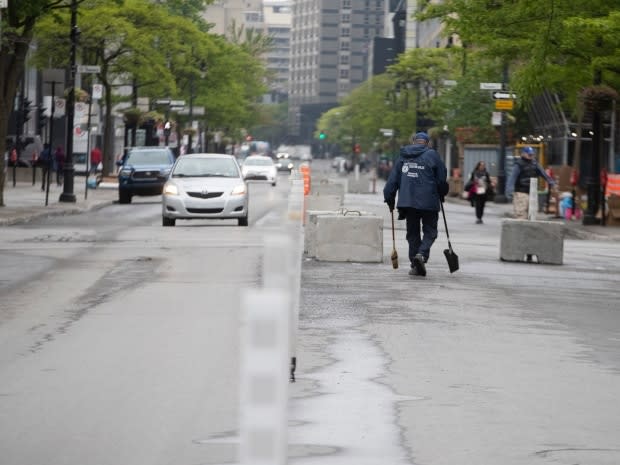Would closing Ste-Catherine Street to cars save downtown? Montreal business groups think so
Two business lobby groups say closing Montreal's most famous commercial strip to vehicular traffic would help revive the downtown core — a normally bustling district that has been left in tatters by the pandemic.
Making Ste-Catherine Street a pedestrian-only corridor between Papineau and Atwater avenues is one of eight emergency measures the city could take to stave off the woes wrought by the economic shutdown, says Michel Leblanc, preesident and CEO of the Chamber of Commerce of Metropolitan Montreal (CCMM).
"If we do nothing, there will be massive closures in the coming months due to the lack of customer traffic and the high rents," Leblanc told Radio-Canada.
The downtown core has been hit severely by the loss of 100,000 students, millions of tourists and a huge proportion of the 310,000 workers who normally commute to offices in the sector — an estimated 80 per cent of whom are now working from home.
Closing a 4.5-kilometre stretch of Ste-Catherine Street to vehicular traffic is a key recommendation that the CCMM is making to city administrators, in collaboration the Partenariat du Quartier des spectacles, headed by Monique Simard.
The two groups published their plan in an extensive report that includes suggestions ranging from allowing alcoholic beverages to be consumed on pedestrian streets to authorizing pop-up markets in public spaces.
"The whole idea is to get people to consider coming downtown to help the merchants," said Leblanc.
The report suggests offering merchants modified versions of Canada's rent assistance and low-interest loan programs, while deploying various strategies that would allow people to visit downtown safely, with hand-washing stations and street furniture that is carefully arranged to promote physical distancing.
The report says Ste-Catherine Street and some intersecting streets should be closed for the entire summer, providing walking routes to places like the Old Port. This should be done while allowing access to parking garages and deliveries during off-peak hours, the report says.
The report also suggests speeding up the permit approval process to make it easier for businesses and visitors to use public spaces.
Plante administration has 'open mind' to new ideas
The action plan was requested by Montreal Mayor Valérie Plante, as she continues to draw up an economic recovery strategy for the city.
On Tuesday, the mayor called on provincial and federal governments to help cover a looming $500-million deficit, as the city struggles to keep its public transit network afloat in this new work-from-home reality.
But taking steps as audacious as shutting down Ste-Catherine Street to cars isn't a decision the city will make on its own, said the executive committee member in charge of economic development, Coun. Luc Rabouin.

"We want to work with the local merchants on Ste-Catherine to develop the best project, in consensus with them," he said.
"We are of open mind to pedestrianizing all the street, if that's their choice."
Rabouin said another strategy could be to close more sections of Ste-Catherine, as is already done between Saint-Hubert and Papineau streets and in the Quartier des spectacles.
More pedestrian-only streets
No matter what happens with Ste-Catherine, Rabouin said, Montreal is pushing forward with efforts to create pedestrian-only streets in other sections of the city, while other streets are being redesigned to cater more to active transit.
One example is closing the entire length of Mont-Royal Avenue on the Plateau, where Rabouin is borough mayor.
"We're working on that, borough by borough, with our local merchants' associations and partners," he said.
"There are some other projects that are discussed locally, and we really work closely with our local partners to decide what is the best way to reorganize our commercial streets."

